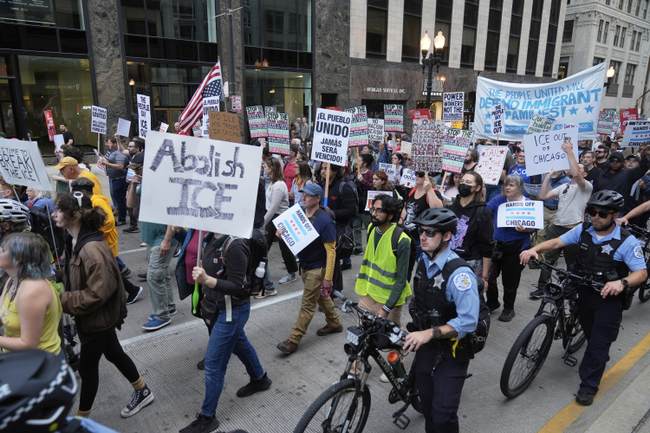
It’s not terribly surprising, the rulings that issued forth from the Northern District of Illinois on Thursday: two cases, each challenging the Trump administration’s federalization/deployment of National Guard troops to Illinois; similar to challenges filed in California and, more recently, Oregon.
First, there is the case styled Chicago Headline Club v. Noem. This one challenges the use of federal law enforcement in and around the Broadview, Illinois, ICE facility — particularly as it relates to “journalists,” but also as to protesters — asserting that the government is violating the First Amendment, the Religious Freedom Restoration Act, the Fourth Amendment, and the Administrative Procedures Act. The plaintiffs in that case asked for a broad array of relief and, in a 12-page opinion/order issued Thursday morning, U.S. District Court Judge Sara Ellis obliged.
The temporary restraining order (TRO) issued by Ellis sets forth a lengthy list of all the actions federal law enforcement is prohibited from taking in the Northern District of Illinois, as well as requiring all uniformed federal law enforcement personnel to “have visible identification (for which a unique recognizable alphanumeric identifier sequence will suffice) affixed to their uniforms or helmets and prominently displayed, including when wearing riot gear.”
RELATED: War of Words Heats Up Between Pritzker, Trump As Guard Arrives in Chicago—’You Should Be in Jail!’
New: 9th Circuit Presses Pause on TRO Issued by Oregon Judge re: National Guard
Next, there is the case styled State of Illinois v. Trump, in which the State of Illinois and City of Chicago challenge Secretary of War Pete Hegseth’s October 4th invocation of “10 U.S.C. § 12406 to federalize and bring under Department of Defense control up to 300 members of the Illinois National Guard, over the objection of the Governor of Illinois (“Federalization Order”), and, on October 5th, another up to 400 National Guard from the State of Texas to deploy into Chicago (“Texas Mobilization Order”).” In that case, Judge April Perry issued a brief two-page TRO on Thursday afternoon that provides, in pertinent part, that:
Defendants, their officers, agents, assigns entered, and all persons acting in concert with them, are temporarily enjoined from ordering the federalization and deployment of the National Guard of the United States within Illinois.
The administration has already filed a notice of appeal in the second case, so the 7th Circuit Court of Appeals will soon be noodling on that. I expect they’ll also file one in the first case, too.
In both instances, the judges, like their counterparts in California and Oregon, dutifully found the administration to have exceeded its authority. The 9th Circuit is currently entertaining challenges to the California and Oregon ruling, and we’ll continue to monitor all the cases to see what they — and eventually the 7th Circuit — do with these district court orders. (And, ultimately, we’ll likely see one or more of these cases land before the Supreme Court.)
There’s no way to predict for certain how these cases will ultimately shake out, but if I were placing bets on them, my money would be on the administration.
Editor’s Note: The Schumer Shutdown is here. Rather than put the American people first, Chuck Schumer and the radical Democrats forced a government shutdown for healthcare for illegals. They own this.
Help us continue to report the truth about the Schumer Shutdown. Use promo code POTUS47 to get 74% off your VIP membership.

















